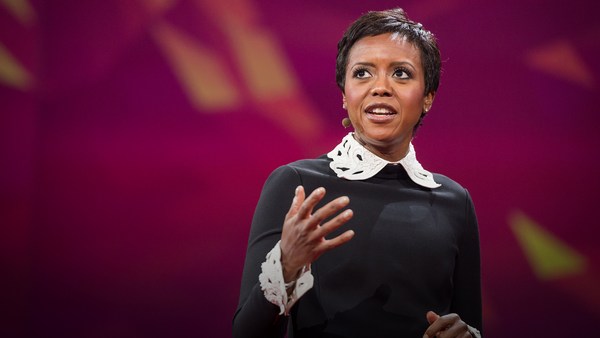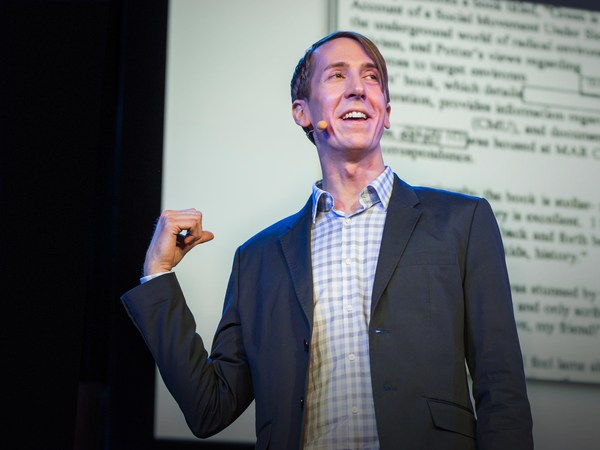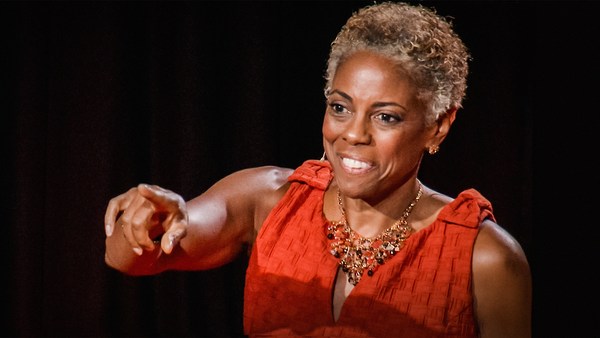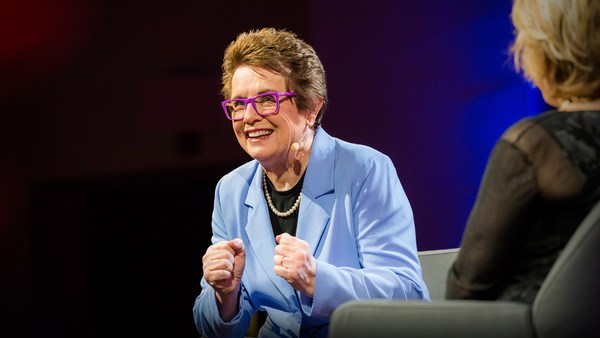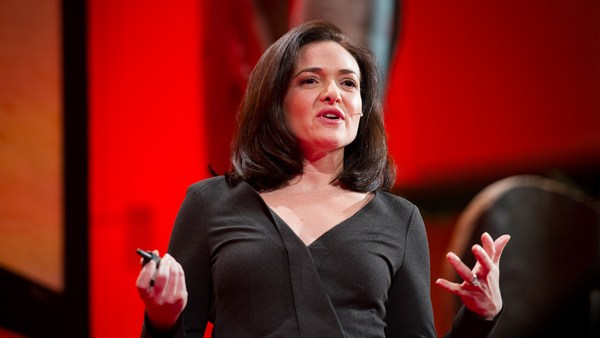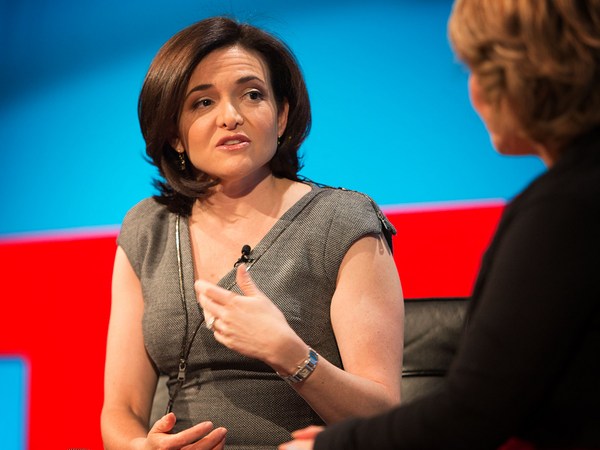Leah Chase: Oh, this is beautiful. Oh, gosh, I never saw such a room and beauty and strength like I'm looking at. That's gorgeous. It is. It is a beautiful room.
Pat Mitchell: I almost said your age, because you gave me permission, but I realized that I was about to make you a year older. You're only 94.
(Laughter)
(Applause)
LC: Yeah, I'm only 94.
(Applause)
I mean, you get this old and parts start wearing out. Your legs start wearing out. The one thing that my children always say: "But nothing happened to your mouth."
(Laughter)
So you've got to have something going, so I've got my mouth going.
(Laughter)
PM: So Mrs. Chase, the first time we were there, I brought a group of young women, who work with us at TED, into the kitchen, and we were all standing around and you had already cooked lunch for hundreds of people, as you do every day, and you looked up at them. You have to share with this audience what you said to those young women.
LC: Well, you know, I talk to young women all the time, and it's beginning to bother me, because look how far I came. I'd come with women that had to really hustle and work hard, and they knew how to be women. They didn't play that man down. And, well, we didn't have the education you have today, and God, I'm so proud when I see those women with all that education under their belt. That's why I worked hard, tried to get everybody to use those resources. So they just don't know their power, and I always tell them, just look at my mother, had 12 girls before she had a boy.
(Laughter)
So you know how I came out.
(Laughter)
Now, she had 14 children. She raised 11 of us out of that 14, and up until last year, we were all still living, a bunch of old biddies, but we're still here.
(Laughter)
And sometimes we can be just cantankerous and blah blah blah blah blah, but we still go. And I love to see women. You don't know what it does for me to see women in the position that you're in today. I never thought I'd see that. I never thought I'd see women be able to take places and positions that we have today. It is just a powerful thing.
I had a young woman come to me. She was an African-American woman. And I said, "Well, what do you do, honey?" She said, "I am a retired Navy pilot." Oh God, that just melted me, because I knew how hard it was to integrate that Navy. You know, the Navy was the last thing to really be integrated, and that was done by Franklin Roosevelt as a favor to an African-American man, Lester Granger, that I knew very well. He was the head of the National Urban League back there, and when Roosevelt asked him, he wanted to appoint Lester as maybe one of his cabinet members. Lester said, "No, I don't want that. All I want you to do is integrate that Navy." And that was what Franklin did. Well, Franklin didn't live to do it, but Truman did it. But when this woman told me, "I have flown everything there is to fly," bombers, just all kinds of planes, it just melted me, you know, just to see how far women have come. And I told her, I said, "Well, you could get into the space program." She said, "But Ms. Chase, I'm too old." She was already 60-some years old, and, you know, you're over the hill then.
(Laughter)
They don't want you flying up in the sky at 60-something years old. Stay on the ground. When I meet women, and today everybody comes to my kitchen, and you know that, and it upsets Stella, my daughter. She doesn't like people coming in the kitchen. But that's where I am, and that's where you're going to see me, in the kitchen. So when they come there, I meet all kinds of people. And that is the thing that really uplifts me, is when I meet women on the move. When I meet women on the move, it is good for me. Now, I'm not one of these flag-waving women. You're not going to see me out there waving. No, I don't do that.
(Laughter)
No, I don't do that, and I don't want any of you to do that. Just be good women. And you know, my mother taught us ... she was tough on us, and she said, "You know, Leah," she gave us all this plaque, "to be a good woman, you have to first look like a girl." Well, I thought I looked like a girl. "Act like a lady." That, I never learned to do.
(Laughter)
"Think like a man." Now don't act like that man; think like a man. And "work like a dog."
(Laughter)
So we learned that the hard way. And they taught you that. They taught you what women had to do. We were taught that women controlled the behavior of men. How you act, they will act. So you've got to do that, and I tell you all the time. You know, don't play this man down. It upsets me when you may have a husband that maybe he doesn't have as much education under his belt as you have, but still you can't play him down. You've got to keep lifting him up, because you don't want to live with a mouse. So you want that man to be a man, and do what he has to do. And anyway, always remember, he runs on cheap gas.
(Laughter)
So fill him up with cheap gas --
(Laughter)
and then, you got him. It's just so --
(Laughter) It's just --
PM: You have to give us a minute to take that in.
(Laughter)
LC: When I heard this young lady speak before I came out -- she was so beautiful, and I wished I could be like that, and my husband, poor darling -- I lost him after we were married 70 years -- didn't agree on one thing, never did, nothing, but we got along together because he learned to understand me, and that was just hard, because he was so different. And that lady reminded me. I said, "If I would have just been like her, Dooky would have really loved it."
(Laughter)
But I wasn't. I was always pushy, always moving, always doing this, and he used to come to me all the time, and he said, "Honey, God's going to punish you."
(Laughter)
"You -- you're just not grateful." But it isn't that I'm not grateful, but I think, as long as you're living, you've got to keep moving, you've got to keep trying to get up and do what you've got to do.
(Applause)
You cannot sit down. You have to keep going, keep trying to do a little bit every day. Every day, you do a little bit, try to make it better. And that's been my whole life. Well, I came up in the country, small town, had to do everything, had to haul the water, had to wash the clothes, do this, do that, pick the dumb strawberries, all that kind of stuff.
(Laughter)
But still, my daddy insisted that we act nice, we be kind. And that's all. When I heard this young woman -- oh, she sounds so beautiful -- I said, "I wish I could be like that."
PM: Mrs. Chase, we don't want you to be any different than you are. There is no question about that. Let me ask you. This is why it's so wonderful to have a conversation with someone who has such a long view --
LC: A long time.
PM: to remembering Roosevelt and the person he did that favor for. What is in your head and your mind and what you have seen and witnessed ... One of the things that it's good to remember, always, is that when you opened that restaurant, whites and blacks could not eat together in this city. It was against the law. And yet they did, at Dooky Chase. Tell me about that.
LC: They did, there. Well, my mother-in-law first started this, and the reason she started is, because her husband was sickly, and he would go out -- and people from Chicago and all the places, you would call his job a numbers runner. But in New Orleans, we are very sophisticated --
(Laughter)
so it wasn't a numbers runner, it was a lottery vendor.
(Laughter)
So you see, we put class to that. But that's how he did it. And he couldn't go from house to house to get his clients and all that, because he was sick, so she opened up this little sandwich shop, so she was going to take down the numbers, because he was sick a lot. He had ulcers. He was really bad for a long a time. So she did that -- and not knowing anything, but she knew she could make a sandwich. She knew she could cook, and she borrowed 600 dollars from a brewery. Can you imagine starting a business today with 600 dollars and no knowledge of what you're doing? And it always just amazed me what she could do. She was a good money manager. That, I am not. My husband used to call me a bankrupt sister.
(Laughter)
"She'll spend everything you got." And I would, you know.
PM: But you kept the restaurant open, though, even in those times of controversy, when people were protesting and almost boycotting. I mean, it was a controversial move that you and your husband made.
LC: It was, and I don't know how we did it, but as I said, my mother-in-law was a kind, kind person, and you didn't have any African-Americans on the police force at that time. They were all white. But they would come around, and she would say, "Bebe, I'm gonna fix you a little sandwich." So she would fix them a sandwich. Today they would call that bribery.
(Laughter)
But she was just that kind of person. She liked to do things for you. She liked to give. So she would do that, and maybe that helped us out, because nobody ever bothered us. We had Jim Dombrowski, Albert Ben Smith, who started all kinds of things right in that restaurant, and nobody ever bothered us. So we just did it.
PM: Excuse me. You talked to me that day about the fact that people considered the restaurant a safe haven where they could come together, particularly if they were working on civil rights, human rights, working to change the laws.
LC: Well, because once you got inside those doors, nobody ever, ever bothered you. The police would never come in and bother our customers, never. So they felt safe to come there. They could eat, they could plan. All the Freedom Riders, that's where they planned all their meetings. They would come and we would serve them a bowl of gumbo and fried chicken.
(Laughter)
So I said, we'd changed the course of America over a bowl of gumbo and some fried chicken.
(Applause)
I would like to invite the leaders, now, just come have a bowl of gumbo and some fried chicken, talk it over and we'd go and we'd do what we have to do.
(Applause)
And that's all we did.
PM: Could we send you a list to invite to lunch?
(Laughter)
LC: Yeah, invite. Because that's what we're not doing. We're not talking. Come together. I don't care if you're a Republican or what you are -- come together. Talk. And I know those old guys. I was friends with those old guys, like Tip O'Neill and all of those people. They knew how to come together and talk, and you would disagree maybe. That's OK. But you would talk, and we would come to a good thing and meet. And so that's what we did in that restaurant. They would plan the meeting, Oretha's mother, Oretha Haley's mother. She was big in CORE. Her mother worked for me for 42 years. And she was like me. We didn't understand the program. Nobody our age understood this program, and we sure didn't want our children to go to jail. Oh, that was ... oh God. But these young people were willing to go to jail for what they believed. We were working with Thurgood and A.P. Tureaud and all those people with the NAACP. But that was a slow move. We would still be out here trying to get in the door, waiting for them.
(Laughter)
PM: Is that Thurgood Marshall you're talking about?
LC: Thurgood Marshall. But I loved Thurgood. He was a good movement. They wanted to do this without offending anybody. I'll never forget A.P. Tureaud: "But you can't offend the white people. Don't offend them." But these young people didn't care. They said, "We're going. Ready or not, we're going to do this." And so we had to support them. These were the children we knew, righteous children. We had to help them.
PM: And they brought the change. LC: And they brought the change. You know, it was hard, but sometimes you do hard things to make changes.
PM: And you've seen so many of those changes. The restaurant has been a bridge. You have been a bridge between the past and now, but you don't live in the past, do you? You live very much in the present.
LC: And that's what you have to tell young people today. OK, you can protest, but put the past behind you. I can't make you responsible for what your grandfather did. That's your grandfather. I have to build on that. I have to make changes. I can't stay there and say, "Oh, well, look what they did to us then. Look what they do to us now." No, you remember that, but that makes you keep going on, but you don't harp on it every day. You move, and you move to make a difference, and everybody should be involved. My children said, "Mother, don't get political," you know.
(Laughter)
"Don't get political, because you know we don't like that." But you have to be political today. You have to be involved. Be a part of the system. Look how it was when we couldn't be a part of the system. When Dutch Morial became the mayor, it was a different feeling in the African-American community. We felt a part of things. Now we've got a mayor. We feel like we belong. Moon tried before Dutch came.
PM: Mayor Landrieu's father, Moon Landrieu.
LC: Mayor Landrieu's father, he took great, great risks by putting African-Americans in city hall. He took a whipping for that for a long time, but he was a visionary, and he did those things that he knew was going to help the city. He knew we had to get involved. So that's what we have to do. We don't harp on that. We just keep moving, and Mitch, you know, I tell Moon all the time, "You did a good thing," but Mitch did one bigger than you and better than you. When he pulled those statues down, I said, "Boy, you're crazy!"
(Applause)
You're crazy. But it was a good political move. You know, when I saw P.T. Beauregard come down, I was sitting looking at the news, and it just hit me what this was all about. To me, it wasn't about race; it was a political move. And I got so furious, I got back on that kitchen the next morning, and I said, come on, pick up your pants, and let's go to work, because you're going to get left behind. And that's what you have to do. You have to move on people, move on what they do. It was going to bring visibility to the city. So you got that visibility -- move on it, uplift yourself, do what you have to do, and do it well. And that's all we do. That's all I try to do.
PM: But you just gave the formula for resilience. Right? So you are clearly the best example we could find anywhere of resilience, so there must be something you think --
LC: I like emotional strength. I like people with emotional and physical strength, and maybe that's bad for me. My favorite all-time general was George Patton. You know, that wasn't too cool.
(Laughter)
PM: It's surprising.
LC: I've got George Patton hanging in my dining room because I want to remember. He set goals for himself, and he was going to set out to reach those goals. He never stopped. And I always remember his words: "Lead, follow, or get out of the way." Now, I can't lead --
(Applause)
I can't be a leader, but I can follow a good leader, but I am not getting out of the way.
(Applause)
But that's just what you have to do.
(Applause)
If you can't lead -- leaders need followers, so if I help you up there, I'm going to ride on your coattails, and I can't count the coattails I've ridden upon.
(Laughter)
Feed you good. You'll help me out.
(Laughter)
And that's what life is all about. Everybody can do something, but please get involved. Do something. The thing we have to do in this city, in all cities -- mommas have to start being mommas today. You know? They have to start understanding -- when you bring this child in the world, you have to make a man out of it, you have to make a woman out of it, and it takes some doing. It takes sacrifice. Maybe you won't have the long fingernails, maybe you won't have the pretty hair. But that child will be on the move, and that's what you have to do. We have to concentrate on educating and making these children understand what it's all about. And I hate to tell you, gentlemen, it's going to take a good woman to do that. It's going to take a good woman to do that.
(Applause)
Men can do their part. The other part is to just do what you have to do and bring it home, but we can handle the rest, and we will handle the rest. If you're a good woman, you can do that.
PM: You heard that first here. We can handle the rest.
LC: We can handle the rest.
Mrs. Chase, thank you so much --
LC: Thank you.
PM: for taking time out from the work you do every day in this community.
LC: But you don't know what this does for me. When I see all of these people, and come together -- people come to my kitchen from all over the world. I had people come from London, now twice this happened to me. First a man came, and I don't know why he came to this -- Every year, the chefs do something called "Chef's Charity." Well, it so happened I was the only woman there, and the only African-American there on that stage doing these demonstrations, and I would not leave until I saw another woman come up there, too. I'm not going up -- they're going to carry me up there until you bring another woman up here.
(Laughter)
So they have another one now, so I could step down. But this man was from London. So after that, I found the man in my kitchen. He came to my kitchen, and he said, "I want to ask you one question." OK, I thought I was going to ask something about food. "Why do all these white men hang around you?"
(Laughter)
What?
(Laughter)
I couldn't understand. He couldn't understand that. I said, "We work together. This is the way we live in this city. I may never go to your house, you may never come to my house. But when it comes to working, like raising money for this special school, we come together. That's what we do. And still here comes another, a woman, elegantly dressed, about a month ago in my kitchen. She said, "I don't understand what I see in your dining room." I said, "What do you see?" She saw whites and blacks together.
That's what we do. We meet. We talk. And we work together, and that's what we have to do. You don't have to be my best friend to work to better your city, to better your country. We just have to come together and work, and that's what we do in this city. We're a weird bunch down here.
(Laughter)
Nobody understands us, but we feed you well.
(Laughter)
(Applause)
(Cheering)
Thank you.
(Applause)
